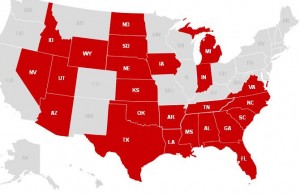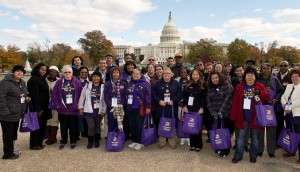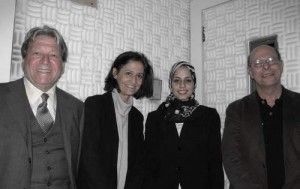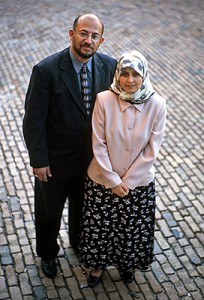Podcast: Play in new window | Download
Updates
- Chilean Court Finds American Journalist Charles Horman Was Murdered With Help of US Government – CCR Case
- Appeals Court Rules Victims of Torture at Abu Ghraib May Sue Private Military Contractor CACI Al-Shimari v. CACI
- Happy Birthday To Julian Assange From Law and Disorder Hosts
- Hobby Lobby: Continued Attack On Women’s Reproductive Rights
- The Meaning of the Fourth of July For the Negro By Frederick Douglas
——
Federal Court Dismisses All Charges Against Dr. Sami al-Arian
In very good news last week the US Department of Justice dropped all of its criminal charges prosecutions etc of activist and Palestinian professor Sami Al Arian. They’ve been trying to persecute, charge him etc. for over 11 years. The case began in 2003 as a criminal case. Although he was charged with some 14 counts he was convicted of none. Rather than face trial again Al-Arian pled guilty to one count served some time and most of us thought it was over by then. He had an agreement that he couldn’t be further prosecuted, that they wouldn’t go after him any longer but that he could be deported. Unfortunately the Department of Justice had a what you would have to call an Islamophobic vendetta against Sami Al Arian. They went after him again, first with the civil contempt of a grand jury he did time for that and in then something utterly unusual they charged him with criminal contempt. The criminal contempt case was pending for five years finally, last week the Department of Justice, the prosecutors dismissed that case.
- We’re feeling a sense of relief that this nightmare appears to be coming to an end.
- We’re happy to hear about the government dismissing the charges against my father.
- In a way it’s vindication for my father, we said in the very beginning. It’s been 11 years. We said all along this is a political case.
- If my father truly were a criminal, they would try their utmost to keep him in prison. Not to say political prisoners aren’t often arrested unjustly, tried and imprisoned but we’re hoping that this finally means this saga will end and my father can live as a free man.
- What preceded it (2003 indictment) was really a decade of harassment. The FBI basically tapping our phone calls, not just my father’s but siblings and I as well. When you think of the Snowden disclosures and the NSA spying on people, for us this is a reality.
- We had no sense of privacy growing up. Simply because my father was a Palestinian activist who dared to challenged the common narrative that you normally hear in the United States.
- Because he really dared to offer a different perspective and to try to help people being subjugated and occupied, so because of that he became a target, not only of the FBI but really powerful pro-Israel voices and forces here in the U.S who tried to smear his name for many many years, accused him of being a terrorist.
- That was part of it, because he was an advocate on Palestinian human rights but also because he was a person who really thought to involve American Muslims politically.
- A lot of these forces I mentioned after 9-11, they really exploited the atmosphere with fear and hysteria and tried to paint my father as this menacing figure, as a terrorist, and at time when the Bush Administration should have been working with American Muslim leaders and try to build a bridge between east and west. Instead the targeted my father and tried to make an example out of him, to say that if you dare to speak out this is what will happen to you.
- He ended up being arrested in 2003 and placed in some of the most atrocious and inhumane conditions that even Amnesty International condemned and was held basically for 2 and a half years before he was basically put on trial.
- The trial lasted for six months, the government spent millions and millions of dollars on the case. They even flew in witnesses from Israel to testify about things my father had nothing to do with.
- After months of negotiations my father signed a plea agreement to end his case once and for all. The government ended up violating the key agreement and basically a prosecutor here in Virginia on ended up at bringing him here and trying to basically retry the Florida case despite the agreement and tried to get him to testify in another case against a Muslim think tank in Virginia and when he refused to testify for the violation of the pre-agreement he was held first on civil contempt and then charged criminal contempt.
- It was very clear that the true intent of this Islamophobic and pro-Israel prosecutor Gordon Kromberg is to retry the Florida case in Virginia, basically pretending it was another case when all of the questions had to do with the Florida case.
- Then the judge received a couple of motions from my father’s attorneys asking to fully dismiss the case and there were no rulings in the past few years by the judge and finally the government decided to drop the charges.
- Luckily in the fall of 2008, my father was released on bail. He was released on house arrest.
- It’s really a testament that there is no case. The think tank that was investigated by Kromberg wasn’t charged for a single crime. They convened one grand jury after another and there were never any charges, any indictment.
- My father was a professor at the University of South Florida, a professor of computer engineering when he was arrested. It’s a very complicated case, as we mentioned stretches over a decade. It’s a case that actually outlasted the Iraq War.
- The next step is in the plea agreement my father unfortunately at the time his back was against the wall, he did end up agreeing to deportation, so now we expect that he will be deported. But as a stateless Palestinian, we don’t know where he’ll be deported.
- My father’s trial attorneys were Bill Moffet and Linda Moreno.
Guest – Laila Al-Arian, a writer and producer for Al Jazeera English. She helped produce the network’s Palestine Papers special in January 2011, a four-day program on the largest diplomatic leak in the history of the Palestinian-Israeli conflict. She is the co-author of Collateral Damage: America’s War Against Iraqi Civilians She is the daughter of Professor Sami Al-Arian.
—–


Supreme Court Delivers Blow to Organized Labor
Last week the United States Supreme Court decided on the case Harris v. Quinn ruling that some government employees didn’t have to pay any fees to the unions representing them. The case was brought by 8 Illinois workers who provided home care to Medicaid recipients. Some of the plaintiffs were mothers who were personal assistants to their disabled children and opposed joining the union. In a 5-4 majority, Justice Samuel Alito Jr.concluded there was type of government employee called a partial public employee who can opt out of joining a union and not be required to pay union fees.
Labor Attorney Bill Herbert:
- Harris versus Quinn I what the ramifications of it while the court held that the majority held that a statute in in Illinois that provided for requiring employees in a bargaining unit to pay agency fee to union was unconstitutional and therefore struck down a provision of a contract that require those employees to pay a fee for being represented by the union.
- These are domestic workers who work for people who are ill and who but also that their salaries and the benefits are paid for by the state.
- These are public employees defined by state law as public employees but it is a background in the National Labor Relations Act which is the Wagner act which was past in 1935 specifically exempts domestic workers in farmworkers from representational rights. These employees if they were just hired by someone to come to their home would not have any rights under the National Labor Relations Act.
- In 1947 Taft-Hartley was passed, Taft-Hartley allows for states to pass laws which are called right to work laws or referred to as right to work laws.
- A state can prohibit a contract to provide that people who decide not to join the union still have to pay a fee related to the representation.
- For public employees there was a case decided in 1977 called Abood which came out of Detroit. In 1977 case public employees it was found constitutional to establish a procedure where people were not members of the public sector union still have to pay a fee for the representational rights that’s negotiations etc. but don’t have to pay for what is sometimes is ideological work which would be in a political activity such as supporting candidates etc.
- There was a procedure created where people can object and they can go in and raise issues and seek to have only monies relevant to collective-bargaining be a part of their fee, so that was Abood.
- The heart of wages and benefits are something that are set by the state. It’s called joint employer relationship.
- The court in the Harris v. Quinn case ruled that its unconstitutional for these employees to be required to pay a fee for the benefits they received based on the representation provided by the union.
- It’s interesting to compare this to Citizens United. In Citizens United, shareholders who are opposed to what a corporation may spend in terms of money for political action in terms of supporting candidates, had no say.
- The Supreme Court found that in Citizens United the First Amendment gives corporations First Amendment rights and the share holders have no say.
- In this case the Supreme Court held that these employees don’t have to pay anything for being represented by the union in collective bargaining for the state.
- Domestic workers are usually low wage employees, very high turn over, people who are generally receiving the low end of the pay scale.
- What we’re looking at is constitutionalizing this concept which was previously statutory in the private sector and making it such that other statues around the country where states have intervened in providing for representational rights for people excluded from the National Labor Relations Act.
- These other statutes may now be challenged based on this ground and in the future it’s based on language of the decision. It’s conceivable that this case could at least the verbiage in the majority decision which Justice Kagan referred to is good to as gratuitous dicta about Abood decision and why was wrongfully decided is something then they come back to be utilized in future cases in future challenges against the requiring union members of bargaining you do not union members to pay a fee.
- In Illinois and in other states domestic workers have been working in the doing a lot of work towards organizing to provide the collective bargaining but for example in New York they don’t have the right to collectively bargain nor farmworkers in other states both farmworkers and domestic workers have rights to unionize.
- These kind of this decision where depending on the structure that the state’s designs could be subject to build the other statues they subject to challenge legally.
- One of the ironies in this case is that one of the reasons why these agency fee arrangements have been states have put them into place is to create stability within bargaining is not having multiple unions trying to come in and and try to organize employees or having conflicts between members who are paying for the services against people who are not paying so the legislatures when they pass in Illinois for example they when they passed the statute were seeking to provide stability in the workplace. Most “Right to Work” states are in the South.
- The current time is being described as the new Gilded Age and new Gilded Age is about wage disparity but is also other things including job security and issues involving the pensions.
- Tenure is under attack pensions are under attack and now there’s an attack upon the idea of having to pay representative to provide you with with representation. A lot of the initiatives that have been enacted in the 20th century are being stripped away and it’s being tied with basically the new Gilded Age.
- The good news of the decision was that Abood was not overturned.
Guest – William A. Herbert is a Distinguished Lecturer at Hunter College, City University of New York and a former Deputy Chair and Counsel to the New York State Public Employment Relations Board (PERB). Prior to his tenure at PERB, Bill practiced labor and employment law in federal and state courts, administrative agencies and in arbitration. Bill is one of the editors of the treatise Public Sector Labor and Employment Law, Third Edition and he has written and spoken extensively on public sector labor law and history.
——————————————————

